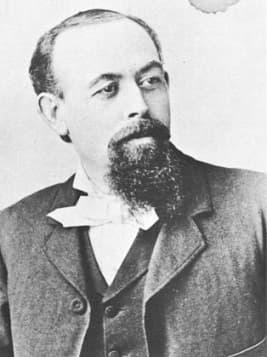
Crossing by Crawley Dake’s Boyhood Home
Intro
Crawley Dake was Canadian born Sept. 1836. But his family crossed to the opposite side of the St. Lawrence River, relocating to Ogdensburg New York when he was very young. He grew up there.

Unknown Date
At age 19 he moved to Romeo, Michigan, opening a store, running for office, getting married, & having a son. He achieved Officer rank in the 5th Michigan Cavalry during the Civil War. A brutal leg injury led to retirement as a Major in 1864.

Taken in Edmond, Oklahoma Territory
When back home he was appointed Detroit’s Chief Deputy Marshal. Likely his government & military service developed his organizational skills. As author Larry D. Ball says he wasn’t “…always in the midst of action…. [but] made the plans and chose good men to carry them out.” He’d also become a good friend of Senator Zachariah Chandler.

Dake Not in This Photo, Though
Unknown Date, from Library of Congress
An Arizona Appointment Needed
Settlers in the Southwest were becoming disturbed by local lawlessness, that became particularly bad in the 1870s. Late that decade & into the 80s, the territory counted at least 36 stage robberies. Often allegedly by Cow-boys in Cochise County & Tombstone. The populous feared the trend would drive away business interests, plus be harmful to citizens.

Sat., Aug. 24, 1878 – Pg. 3
John Hoyt, the Territorial Governor objected when Crawley P. Dake got the assignment as the U.S. Marshal for Arizona Territory June 1878. Oh well! He arrived in Prescott, AZ capital, began his work.

Crawley Dake’s Work as U.S. Marshal
Dake found it difficult dealing with Washington bureaucracy. He requested funding for tracking these so-called Cow-boy outlaws. Washington was slow in getting Dake his funds.

Front Page Story
He appointed his allowed 3 deputies – 1 for each judicial district. One of his hires was Virgil Earp. Precipitating the Earps’ move to Tombstone. For more, he needed Attorney General authorization. But what helped was passage of the federal Posse Comitatus Act. Outlawing use of Army personnel in posses for law enforcement, without Congressional authorization. Thus his work-around was to now hire civilians for posses.
The Governors of Sonora Mexico & Arizona began cooperative extradition efforts for cross-border criminals. Not popular with everyone. And it didn’t always work.
Dake took advantage of all the latest technology of the 1800s! Used the telegraph system, & publishing his telegrams in newspapers for transparency. He published Wanted Posters, giving decent rewards that he could muster up &/or find a budget for. Within 2 years, he’d accomplished much with little outside help. Even giving his own $$ for the effort!

The OK Corral Gunfight’s Effects
He had repercussions from appointing Virgil Earp as Deputy U.S. Marshal. When Virgil was at odds with those known as “The Cow Boys” – around half the local population was at odds with Virgil, and his brothers. But as his boss, Crawley Dake had Virgil’s back.
After the Gunfight at the O.K. Corral, retribution was delivered toward Virgil. He was fired upon while walking at the intersection of 5th & Allen Streets. Gunshots came from the upper story of what’s now The Longhorn. His left arm/shoulder was hit (forever damaged).

-North Cortez St.
May 1877, a Bit Before Dake Arrived
Crawley Dake had a decision to make. Wyatt Earp advanced himself for taking over Virgil’s job of Deputy U.S. Marshal. Dake agreed, appointing Wyatt. Was this a wise decision? Many didn’t think so. Through history, many continued thinking not. Thus his support of the Earps hasn’t served Dake’s story well with some.
About this time of the “Cow Boy” conflict, Harper’s Weekly published an engraving with an editorial called “The Cow-boys of Arizona.” The Epitaph took major exception to it, with good reason. It had errors (common for those times, too!) with quotes from former AZ Acting Governor Gosper that cowboy numbers were 50 max. And Cochise County was so-named after whitish stone found in area silver mines. [Huh??!]
The Epitaph stated “the name of our justly celebrated county – we can forgive the late acting governor for… misrepresentations upon this subject…. the county derived its name from the once famous Apache warrior named Cochise, whose stronghold was in the Dragoon Mountains some twelve miles to the north of this city…. how easy it is for people to be mistaken.”
The Epitaph concluded, defending Arizona, Cochise County, and Tombstone in this lengthy editorial, & also defending Crawley Dake, as you can see in the following excerpt:

How He Left
Yes, Dake’s superiors hoped he’d be solving the “Cow Boy” area conflicts. That remained unsuccessful, culminating in the gunfight, reprisals, & Wyatt’s vendetta ride. But was he given the full support needed? Was it all on him?
Dake left his U.S. Marshal position July 1882 upon his term’s end. He was subsequently accused of misuse of funds while in office. But he was fully cleared.
Dake stayed in Prescott AZ, living on Marina St. Occupied himself again in merchandising, & continued dabbling in mining.
By autumn 1888 his illness was overtaking him, originating from his war wound. Until Crawley Phillips Dake succumbed April 9, 1890.

April 16, 1890
He’s buried in Citizens Cemetery, in Prescott.

Historical places & events create curiosity for facts about people who roamed the Tombstone area & the Old West. What’s the true story? Can we discover the authentic history?
And we enjoy sharing what we find with you.
We hope we’ll see you in town sometime, (sigh – eventually in the future!) seeing areas where they spent time – back in the 1800s.
Let us know if you’ll be going to an upcoming event! Tell us how you liked any of them, or what you visited here! Just reply to this newsletter for easy input! (Let us know if we can use your comments – & how to credit you.)
